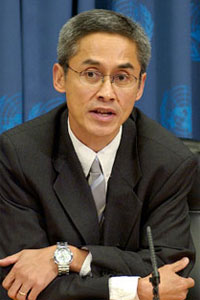Thailand's most recent report on women's rights -- available on the United Nations' website -- is part of the eighth cycle of reporting under the Convention on the Elimination of All Forms of Discrimination Against Women (CEDAW), to which the country became a party in 1985.
The questions now are: Where are women in the echelons of power, and how can their participation in business amplify their enjoyment of human rights?
Decades ago, women were blocked from enjoying positions of power, such as becoming judges, prosecutors, district officials and generals. Much progress has been made to overcome such impediments. Yet, while the door is now open to access those positions, the results of the latest realignment of Thai politics after last year's national elections are still rather disappointing.
There are only five women in the 35-member cabinet, and out of the 500 members of parliament, 403 are men, and 97 are women. This represents only about 20% of the total, while the international guidance is that 30% should be the minimum. By the way, Yingluck Shinawatra, the country's only woman prime minister to date, is still in exile after being toppled by a (male-dominated) coup.
More directly on the participation of women in business, various sources indicate that in Thailand, between 30 to 40% of senior management positions are in the hands of women, while about 20% of businesses are owned by women. Yet, if those statistics are disaggregated further, the disparities are more glaring. Those senior positions tend to be senior finance officers rather than other positions of power. Ownership of business by women tends to be in small and medium-scale enterprises (SMEs) rather than mega enterprises.
Globally, access to procurement opportunities by women in business is very constrained -- according to a UN-related source, about 1%. This calls into play the nature of power dynamics and related monopolies, which are inherently patriarchal. Demonopolisation, therefore, needs a gender lens.
Dissection of those gaps reveals other loopholes. In today's world of business and work, a large number of women are in the informal sector, such as agriculture. Much of their time is still spent on executing various chores at home, such as child rearing and home economics, which are not counted as work in statistical terms for remuneration. Where they access formal employment, there is still a gender pay divide, despite the Thai labour protection law, which ensures equal pay (in principle).
On the constructive front, that law was amended not long ago to enable 98 days of maternal leave, but part of it is as unpaid leave. Equal parenting possibilities, especially via paternity leave, are incipient among some businesses and need to be expanded. There is also limited protection of women employed as domestic workers, and the country is still considering whether to become a party to the International Labour Organization (ILO) treaty -- Convention No.189, to increase protections for these workers, such as the right to minimum pay.
Access to credit is a recurrent issue for SMEs, and this is now further hampered by the very high level of household debt hovering at some 90% of the gross domestic product, as well as the increasingly difficult conduit of corporate debt, which constrains access to loans for entrepreneurship.
The issue of non-Thai women at work and in business should not be overlooked. There are two categories of note: women refugees (alias asylum seekers) and women migrant workers. There are several groups of refugees in Thailand, and some have been here for a very long time. In particular, there have been some 90,000 Myanmar cases in the various camps along Thailand's western flank for over 30 years; they are still not allowed employment beyond the camps. This is a missed opportunity not only in regard to the group's capacity but also in regard to the need to fill in manpower-womanpower gaps.
With regard to migrant labour, much depends upon MoUs with Thailand's neighbours. While the Thai labour protection law does not discriminate between males and females, as well as between regular and irregular workers, those who come as irregulars face more difficulties in accessing justice, safety and fair conditions. In addition, the country's labour relations law still does not recognise the right of migrant workers to set up trade unions and sit on their boards. In the case of state enterprises, there is a general prohibition against the staging of strikes.
Digitalisation and the advent of artificial intelligence are inevitably changing the nature of work. Intriguingly, here and elsewhere, there is a debate on the position of platform "gig" workers, such as those engaged in online food deliveries. The law evolving in various countries, including proposed changes in this country, is to protect these persons not as "employees" entitled to full guarantees under the labour law but as a separate category of "workers" with some rights but not the total range. For instance, while they would be entitled to equal pay, they would not be entitled to form trade unions. Obviously, the need to re-skill and upskill also requires a gender-reflecting mirror.
There is then the issue of violence, compounded by discrimination, in employment. The global community has been increasingly concerned with sexual harassment and other forms of violence. While Thailand now covers these issues, its labour protection law and general criminal law, stereotyped company culture may militate against the search for remedies; it is not easy for a woman to complain about harassment at the workplace due to the longstanding patriarchy. There is also an ILO convention on the issue of workplace violence -- Convention No.190, which the country should consider ratifying, as it will provide more objective standards, monitoring and leveraging for redress.
Behind all that, the heartening truism is that happy people at work and in business (whatever their sex or gender) are more likely to perform productively, engendering benefits for all.
